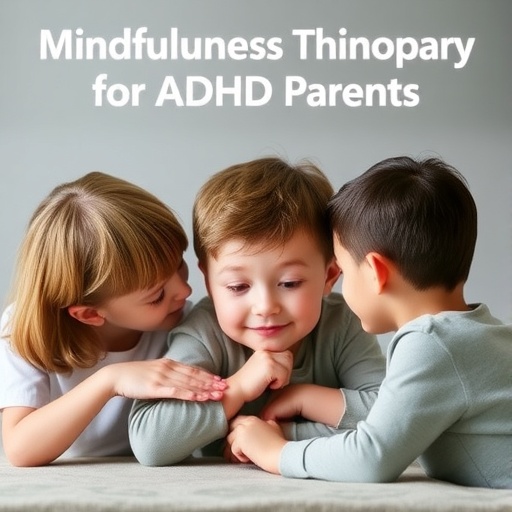In recent years, mindfulness-based interventions have gained significant attention for their potential to alleviate psychological distress and improve mental health outcomes across diverse populations. Now, a pioneering randomized controlled trial (RCT) is set to investigate the efficacy of an online mindfulness program specifically tailored for parents of children diagnosed with attention-deficit/hyperactivity disorder (ADHD). This carefully designed research protocol, outlined by Zhang and colleagues and soon to be published in BMC Psychology, aims to address the unique stressors faced by these parents and measure how virtual mindfulness training could modulate their wellbeing and coping strategies.
Parents of children with ADHD often experience elevated levels of stress, anxiety, and depression due to the persistent behavioral challenges and executive functioning deficits characteristic of the disorder. Traditional psychosocial interventions have demonstrated limited accessibility and feasibility for these caregivers, who frequently juggle numerous responsibilities alongside managing their child’s needs. Hence, the researchers assert that an accessible, scalable, and evidence-based online intervention could represent a transformative approach to supporting parental mental health while indirectly benefiting child outcomes.
The study protocol specifies a randomized controlled trial framework—widely regarded as the gold standard in clinical research—to ensure robust evaluation of the intervention’s effectiveness. Participants will be randomly assigned to either the online mindfulness-based intervention or a waitlist control group, facilitating unbiased comparisons. Mindfulness training involves cultivating moment-to-moment awareness, non-judgmental acceptance, and emotional regulation skills, which are theoretically positioned to reduce caregivers’ reactivity to stress and improve adaptive parenting practices.
Innovation in this trial emanates not only from the digital delivery format but also from its specificity for parents of children with ADHD. The online platform will provide weekly modules incorporating guided mindfulness meditations, psychoeducational materials about stress and ADHD, and interactive activities designed to enhance parental engagement. Importantly, this format permits flexibility, allowing participants to access resources at their convenience—addressing a notable barrier to traditional therapeutic interventions.
From a neuropsychological standpoint, mindfulness training may influence key brain networks implicated in attention, executive control, and emotion regulation—domains frequently dysregulated in ADHD as well as in parental stress responses. By fostering neural plasticity, the intervention might attenuate hyperactivity within the amygdala, a region central to the fight-or-flight response, while enhancing prefrontal cortex functions responsible for top-down regulation. These mechanistic insights underpin the trial’s theoretical rationale.
Quantitative outcome measures will include validated self-report scales assessing parental stress, mindfulness levels, depression, and anxiety symptoms, collected at baseline, post-intervention, and follow-up intervals. Secondary outcomes will explore child-related variables such as parental perceptions of child behavior and family functioning, offering a holistic view of the intervention’s ripple effects within the family system. The rigorous data collection plan strengthens the validity and generalizability of the study’s anticipated findings.
Beyond symptom reduction, the researchers hypothesize that the online mindfulness program will boost parental self-efficacy—the confidence in one’s ability to manage child behaviors and stressors effectively. This is important because heightened self-efficacy has been linked to improved mental health and parenting outcomes in previous literature. Therefore, the intervention could empower caregivers with sustainable coping skills that extend well beyond the formal training period.
The choice of an online platform represents a forward-thinking adaptation to modern societal needs, particularly amid challenges such as the COVID-19 pandemic, which has heightened demand for remote therapeutic solutions. Leveraging technology allows for cost-effective implementation with the potential for wide-scale dissemination, making evidence-based support accessible to families in geographically or socioeconomically diverse contexts.
Additionally, the inclusion of psychoeducation about ADHD aims to enrich participants’ understanding of their child’s condition, reframing symptoms in a compassionate light and reducing parental blame or self-criticism. This integrative approach addresses both the emotional and cognitive domains involved in caregiving stress, increasing the intervention’s comprehensiveness.
The research team’s transparent publication of the study protocol promotes reproducibility and open scientific dialogue, encouraging other investigators to replicate or build upon this endeavor. Sharing detailed methodology before the trial’s completion enhances accountability and facilitates peer feedback on study design, recruitment strategies, and analytic plans.
Challenges anticipated by the investigators include maintaining participant engagement throughout the intervention and minimizing attrition. The online format, while convenient, relies heavily on intrinsic motivation, which can wane over time. To combat this, the program incorporates interactive elements and reminders designed to sustain commitment and foster a sense of community among participants despite physical separation.
If successful, the findings from this RCT could have significant clinical and public health implications. Integrating online mindfulness training into existing ADHD support services would provide a scalable, adjunctive tool to enhance parental wellbeing and potentially improve child development trajectories. Such integration aligns with holistic models of care emphasizing family-centered approaches.
Moreover, this study addresses critical gaps in the literature by focusing on parental mental health—a domain frequently overlooked in ADHD research despite its central role in child outcomes. By targeting this population with tailored interventions, the trial advances the field toward more inclusive and family-oriented therapeutic paradigms.
The investigators acknowledge the necessity of long-term follow-up to assess the durability of effects and the potential for mindfulness practice to buffer against future stressors. Future extensions of this research may also explore biomarkers or neuroimaging correlates to elucidate underlying neural changes associated with intervention response.
In conclusion, Zhang and colleagues’ upcoming randomized controlled trial heralds a promising stride in harnessing digital mindfulness-based interventions to support parents of children with ADHD. Through meticulous design, theoretical grounding, and innovative delivery methods, this study stands poised to enrich the arsenal of evidence-based approaches aimed at mitigating caregiver burden and enhancing family well-being in an increasingly digital world.
Subject of Research: Online mindfulness-based intervention effects on parents of children with attention-deficit/hyperactivity disorder (ADHD)
Article Title: A randomized controlled trial for evaluating the effects of an online mindfulness-based intervention for parents of children with attention-deficit/hyperactivity disorder: a study protocol
Article References:
Zhang, Z.J., Lo, H.H.M., Bögels, S.M. et al. A randomized controlled trial for evaluating the effects of an online mindfulness-based intervention for parents of children with attention-deficit/hyperactivity disorder: a study protocol. BMC Psychol 13, 610 (2025). https://doi.org/10.1186/s40359-025-02929-0
Image Credits: AI Generated




